Swedish minister Margot Wallstrom: shaking up the world with words
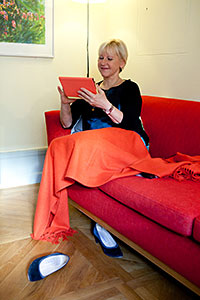
Simply sign up to the Life & Arts myFT Digest -- delivered directly to your inbox.
Towering over a busy roundabout in downtown Stockholm is a bronze statue of King Gustav II Adolph on his horse. Almost 400 years after Gustav II conquered northern Europe, Sweden’s foreign minister, Margot Wallstrom, is shaking up the world not with weapons, but words, in an ornate yellow building just across the street. Since taking her post in October last year, the veteran Social Democratic politician has recognised the Palestinian state, denounced Saudi Arabia’s “medieval” floggings and adopted a “feminist foreign policy” that includes calling for a halt to sexual violence against women in war.
Now, as desperate migrants trek towards Sweden, and neighbouring EU countries balk at accepting refugees, Wallstrom, a former EU commissioner, insists that the rest of Europe must join Sweden and Germany in shouldering the burden. “We have to find solidarity and help each other out. We have to share responsibility for the refugees based on our shared values . . . If one country is putting up a fence, and another is opening up, this is not sustainable,” she says.
There is little hint of the crisis on a sunny afternoon in the rooms of the foreign ministry, which looks on to the Royal Opera, bridges and blue waters beyond. Wallstrom, 60, who is softly spoken in person, greets visitors at the door of a red-silk-themed room of the Prince Royal’s Palace. “It’s an old palace from the 1600s . . . Sophia Albertina, sister of Gustav III, bought it in 1783,” says Wallstrom, leading the way into the Blue Salon with its display of 18th-century furniture. “They’ve tried to restore the covers with the original patterns,” she says, noting that the royal bedroom where she keeps her desk was the princess’s sewing room. “She would sit with her maids, and make the wall tapestries. I can well imagine that she’s sitting sewing when I am at my desk.”
Today, rolls of fine silk on the gilded, Gustavian-style desk have given way to urgent reports from the wars in Syria and Iraq. Sweden has taken in more migrants per capita than any European country. “This year we’ve had over 80,000 asylum-seekers,” says Wallstrom, “And we’ve given asylum to over 80,000 Syrians since 2011.”
Wallstrom — a mother of two sons, Viktor, 30, and Erik, 22 — has been married to her husband, Hakan, for 34 years. She got her political start protesting strife in Vietnam and Chile from the town of Skelleftea, on the edge of Lapland. “A neighbour whose children I babysat asked me if I wanted to be one of the young people to start a Social Democratic youth club,” she says. “It was a political time. It started with international solidarity.” She also discovered power in local politics, and was writing newspaper articles at 17. “I learnt we could change things; get an extra bus [scheduled] at midnight.”
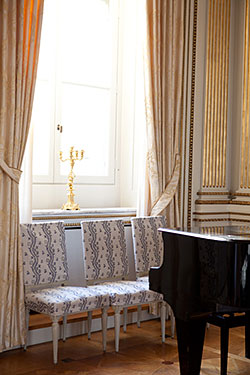
At 25, she was elected to parliament and, by 34, was minister of consumer affairs, with two other ministerial posts (culture, social affairs) between 1988 and 1998. Regularly topping popularity polls and tipped as a future Social Democratic leader, in 1999 she left for Brussels to become EU commissioner for the environment until 2004 and then EU communications commissioner until 2009. In 2010 she became the first UN special representative on sexual violence in conflict. She returned last year to run the foreign ministry.
“We have meals for foreign guests in here,” says Wallstrom, heading through a gallery and pausing in front of Napoleonic-era portraits of noble ministers with necklaces of medals and elaborate oiled curls. “This is interesting. Sometimes people live with the impression men are not vain,” she notes wryly, turning into another reception room.
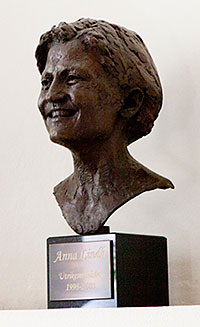
Lined up around the room, which is fitted with red-checked drapes, are portraits of previous foreign ministers. On the far wall is a giant, 17th-century oil painting of a bewigged count, Chancellor Axel Oxenstierna. “He tried to introduce modern administration. He was a powerful guy,” she says.
To the left are portraits of more recent foreign ministers, including one of Wallstrom’s close colleague Anna Lindh, who was assassinated in Stockholm’s NK store in 2003 by Mijailo Mijailovic, a mentally ill Swede of Serbian descent. “It took away all the joy of being politically active,” says Wallstrom, “She was not a confrontational person. She was kind. I’ve tried to learn from that.”
Favourite thing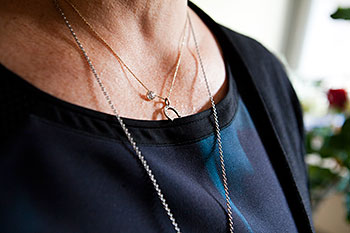
“It’s my favourite thing because when I started as a minister of foreign affairs, I got it from my two sons,” says Wallstrom, of a silver necklace with a charm. “It’s a horseshoe, for good luck.”
She then plucks out a small paperback from her bag and hands it over to me. “It’s How to Cure a Fanatic, by Amos Oz. I love this book. It has ways to fight fanaticism and extremism.”
She leads the way into more modest personal quarters that include a small kitchen, where she pours coffee. “It may be too strong,” she warns, turning into a simple private room brightened by orange woven blankets brought in to make the space more cosy. Here, she reads briefings and ebooks on her iPad at the end of the day. “I’ve told my sons that in life they should always read books. And do something unselfish.”
The migrant crisis has prompted Wallstrom to increase calls for global action to halt the violence generating the exodus to Europe. “How do you fight rape as an ideology?” she says, referring to the Islamic State of Iraq and the Levant. “When women are sold on a modern slave market as pieces of meat it’s time that the international community reacts at the highest level, shows it has the means and strength and tools to stop it . . . Violence against women must be defined as a peace and security issue.”
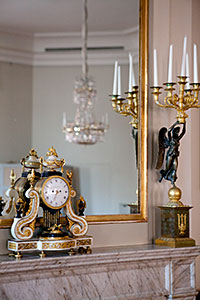
Wallstrom’s stance on human rights sparked criticism this spring. Her remarks on abuse in Saudi Arabia prompted a diplomatic spat: she was barred from giving a speech to the Arab League, the Saudis recalled their ambassador and the Swedish government cancelled a Saudi security agreement, risking $1bn of arms sales, and creating a backlash from Swedish industrialists arguing for free trade.
Yet Wallstrom says she received thanks for her outspokenness from around the world. “Every day flowers arrived. People long for those who stand up for their values,” she says, noting that Swedish-Saudi relations have been normalised, with both ambassador and trade restored.
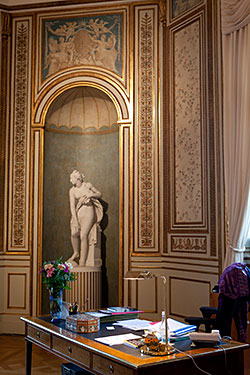
Her frankness extends to migrants. Asked about the proliferation of temporary migrants of Roma origin begging on the streets of Stockholm, she says, “We have to act in a humane way but they have to go back to Bulgaria and Romania.” She adds that both EU countries have received substantial Swedish aid and should take care of their citizens. “The children must go to school.”
Now, Wallstrom must help convince her EU counterparts to offer homes to tens of thousands of refugees. “We have to show that we are capable of dealing with these numbers,” she says. Can Sweden cope? “We’ve done it before, in the 1990s with the Balkans. It will be a strain on our systems — education, housing — but we can do it with help. If we shared responsibility between 28 [EU] countries, it would not be a strain.”
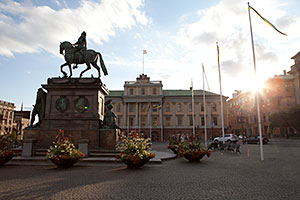
Our time is almost up. She glances at the fine weather outside, but will have to wait to enjoy it. When not travelling, Wallstrom, who owns a small Stockholm flat, spends weekends at her home in Varmland in western Sweden with her husband, whom she credits for supporting her political life. “You have to choose the right husband. Why not choose a carpenter who can do all the practical work and is a smart guy, handsome and the best father?” she says, passing back into the staterooms — once filled with maids at embroidery and bewigged counts plotting war.
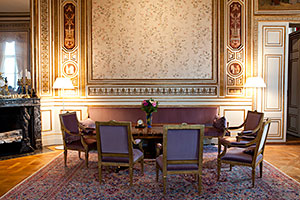
For the war-weary who reach Sweden, an outpouring of sympathy has temporarily quieted the anti-immigrant party, Sweden Democrats, now polling at up to 27 per cent. “It has been very moving. We now have to manage that engagement in a wise way,” says Wallstrom, who acknowledges a possible extremist backlash. But as the exhausted masses trudge towards northern Europe, Wallstrom says she will keep pressing EU leaders on their common values. “Our humanity trumps all.
Photographs: Lina Haskel
Comments